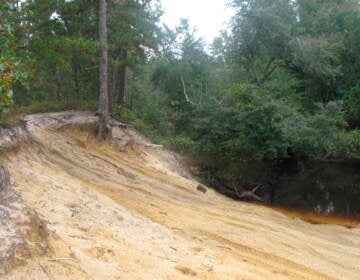A glimmer of hope for Pinelands preservation — if key reforms are made
Advocates are pushing to better safeguard groundwater supplies, protect threatened and endangered wildlife, and enact climate change policies.

This Jan. 6, 2014 photo shows a section of the Pinelands region in Lakehurst N.J. (AP Photo/Wayne Parry)
This story originally appeared on NJ Spotlight.
For much of the last decade, the Pinelands Commission has been in a funk — at least from the perspective of the Pinelands Preservation Alliance.
Its often divided 15-member commission, along with poor staff leadership, stymied actions to protect the 1.1-million-acre preserve. The dysfunction led to what the alliance viewed as harmful approvals of pipeline projects, a growth in illegal off-roading vehicles destroying sensitive Pinelands habitat, and a failure to consistently uphold rules of the agency’s Comprehensive Management Plan.
Yet, in releasing its annual State of the Pinelands report, the alliance was cautiously upbeat about the future, provided the commission starts implementing several reforms under discussion for a number of years. Those reforms include safeguarding groundwater supplies, protecting threatened and endangered wildlife and plants, and giving more attention to policies dealing with climate change.
Part of the optimism stems from a reinstituted Pinelands Commission, which now is only one member shy of its statutory membership. After failing for three years to get his three strong conservationists nominated to the commission, Gov. Phil Murphy won approval in the lame-duck legislative session for two of them, as well as Theresa Lettman, who originally was nominated in 2019.
“In terms of the commission, we are definitely moving in the right direction,’’ said Jaclyn Rhoads, deputy executive director of the alliance. She also called for enactment of reforms outlined by the organization. “If those things happen, then we’re in a really good place.’’
A top priority for the Pinelands alliance, a nonprofit that monitors preservation of the natural resources preserve, is filling the vacant executive director’s position at the commission. The role has been open for several months. With a strong new executive, a newly invigorated commission can now turn things around and start getting things done for the Pinelands Natural Reserve, the alliance said.
Mounting threats to the preserve
The commission needs to be more proactive to protect the preserve as threats mount, the alliance said. Development projects have increased dramatically in the last six months. Climate-change impacts are accelerating each year. And while the governor, the commission and state agencies like the Department of Environmental Protection won some kudos, they earned a thumbs down for poor decisions involving the Pinelands.
The alliance criticized Murphy — a year after praising him — for restoring full $10 million funding for the payments in lieu of taxes (PILOT) program, which provides funding to municipalities to protect large tracts of forests and parks. In Murphy’s proposed budget for the fiscal year that begins in July now being reviewed by lawmakers, the program, however, has been cut to $6.5 million.
Given New Jersey’s huge budget surplus, the program provides a relatively small amount of funding to support towns’ open-space reservation programs, according to the alliance.
The commission failed to enact needed reforms to its master plan in the past year. The absence of these reforms becomes increasingly glaring as the impacts of climate change make their way into life in the Pinelands, according to the report. The reforms include protections to the Kirkwood-Cohansey aquifer and conservation of the Black Run headwaters.
As for DEP, the agency was faulted for reducing fines by more than half from 13 construction spills in New Jersey Natural Gas’ building of the Southern Reliability Link. One spill resulted in the condemnation of a home. Initially, DEP issued a fine of $270,000, but in a later settlement with the utility, it was trimmed to $108,125.
The agency also received a thumbs down for its Public Lands Management for failing to protect the ecological integrity of the Pinelands with an effective strategy to combat illegal off-roading there.
Not just a few areas in the Pinelands are heavily used by those vehicles, Rhoads said, including in many locations around ponds. “It is a matter of enforcement,” she said. On the positive side, the state has increased fines for illegal off-road activity from $74 to $249 in the past year.
WHYY is your source for fact-based, in-depth journalism and information. As a nonprofit organization, we rely on financial support from readers like you. Please give today.






